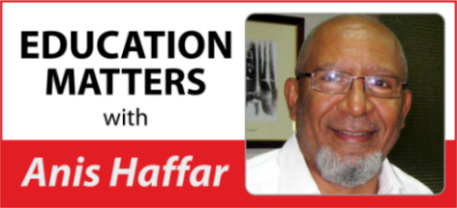-
A call for innovative approaches and commitment
By Anis Haffar
Why have dreams if you can’t live them? Why have interests or curiosities if you can’t pursue them? Why have hypotheses if you can’t test your finer instincts through them? Such stuff are the critical elements that drive purposeful 21st century education. The journey draws new questions, presents bold challenges, and enhances problem solving abilities for national prosperity and self-fulfillment.
And that is exactly why the likes of Singapore, Japan and Finland keep topping international education benchmarks, raising those nations’ standards of living accordingly. Ghana must always look up for the best, not follow the decrepit colonial models. A home brewed inspiration may be drawn from the mindset of John Mensah Sarbah (1864 – 1910) who envisioned education in the Gold Coast on the level with Japan, way back then. Similarly, Kwegyir Aggrey (1875 – 1927) speaking to the ultimate purpose in education, cautioned, “Don’t tell me what you know; show me what you can do!” Such exemplars are indeed the educational mentors we need today!
In order to pursue relevant education for Ghana, we need to begin to understand that the colonial “hands-in-the-pockets” grammar type format (which is still being pursued unwittingly but relentlessly, across the public education spectrum) lost its lustre years back. The passive elitist types follow the beaten path to depravity; they will not lead to a future that will lift Ghana out of poverty – away from the begging and borrowing traps.
I tend to use February 1964 as the inflection point when Ghana missed the clue from Lee Kuan Yew (1923 – 2015). In his usual thoughtful, blunt, and provocative way, he decried how Ghana’s best brains wasted away sitting in bare classrooms chewing on Latin and Greek verbs, instead of focusing on adding value to the nation’s abundant natural inputs and endowment. Like it or not, that strategic compass is still the most reliable tool with which to navigate curricular objectives, for a future laden with a purpose for national prosperity.
Why we choose to be plagued by the past is the question every educator, parent, and student must ask every school day. The status quo continues to thwart the minds of the precious youth, and leads to psychological and material deprivation.
There are presently two prevalent education systems: One, The “sitting and waiting” culture: a habit that rewards passivity and conformity through standardized examinations, but strangles imagination and creativity. In the column, “Progressive Education for a Superior Workforce: The transition from theories to hands-on abilities,” (August 18, 2014) I noted that, “It’s a rare person indeed who is raised to sit for 16 years in school – all the way through university – merely dangling information back and forth without any useful hands-on work, and then suddenly released, with a certificate loaded with theories, to now start work in a non-sitting active posture. We are creatures of habit, and that expectation is as fruitless as it is ridiculous.”
 The second is the “thinking and doing” culture where at the earliest ages, the youth are supported to think for themselves, make their own mistakes, find out things for themselves – follow their finer instincts, interests and curiosities – and use technology to advance their thinking in the best ways to solve pressing problems. For this group, the active brain and hands are the best teachers. By reflecting on action, that culture arrives at better decisions to which people commit naturally, with enthusiasm.
The second is the “thinking and doing” culture where at the earliest ages, the youth are supported to think for themselves, make their own mistakes, find out things for themselves – follow their finer instincts, interests and curiosities – and use technology to advance their thinking in the best ways to solve pressing problems. For this group, the active brain and hands are the best teachers. By reflecting on action, that culture arrives at better decisions to which people commit naturally, with enthusiasm.
But where the hands are folded or immobilized, potential and possibilities are missed. Like we say in Twi: “Sɛ wo te faako a, na wote wo adeɛ so!” [To wit: to sit complacently in one place is to miss opportunities!]
To be relevant and purposeful, modern curricular objectives must offer transformative opportunities that address the following key questions: One, do they help to create jobs? Two, do they add value to the nation’s natural endowment and local inputs? Three, do they help to the youth to fill existing jobs that require the use of modern technology? Four, do they help the youth to be entrepreneurs who make it by solving existing national and international problems?
What that means, in a nutshell, is that teachers – across the spectrum, both the basic and tertiary levels – must themselves be upgraded to teach to those requirements. One can’t, for example, teach the digital age youth with an analog mindset, as they say. And it is no joke that continuous education is a great fit for everyone who sees themselves as professional. At the end of the day, the benefits will spread to everybody – both the young and the old, and also curtail the social problems associated with the teeming youth unemployment, and associated frustrations.
For Africa’s leaders to commit to the 21st century demands, let me end with answers to a question that was once asked of Lee Kuan Yew: What qualities define a successful leader? He answered, “They must have the extra drive, intellectual verve, an extra tenacity, and the will to overcome.” He added that the leaders must also have “a natural urge, a natural interest in people, in wanting to do something for them, which they can sense and feel. If you have not go that and you just want to be a great leader, try some other profession.”
[Email: anishaffar@gmail.com]


Good job.
LikeLike